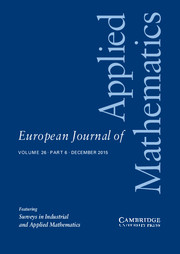Article contents
Identification of multipoles via boundary measurements
Published online by Cambridge University Press: 21 November 2011
Abstract
This paper provides an algorithm for identifying the multipoles of a meromorphic function from the boundary measurements, which can be applied to inverse source problems for a Poisson equation to reconstruct its source such as linear combination of mono and dipolar point sources. After establishing an algorithm that allows to identify the number, the locations and the moments of poles, we provide a stability estimate of the algorithm under the measurement error.
- Type
- Papers
- Information
- Copyright
- Copyright © Cambridge University Press 2011
References
[1]El Badia, A. & Ha-Duong, T. (2000) An inverse source problem in potential analysis. Inverse Probl. 16, 651–663.CrossRefGoogle Scholar
[2]Hämäläinen, M., Hari, R., Ilmoniemi, R. J., Knuutila, J. & Lounasmaa, O. V. (1993) Magnetoencephalography – theory, instrumentation and applications to noninvasive studies of the working human brain. Rev. Mod. Phys. 65, 413–497.CrossRefGoogle Scholar
[3]Jerbi, K., Mosher, J. C., Baillet, S. & Leahy, R. M. (2002) On MEG forward modelling using multipolar expansions. Phys. Med. Biol. 47, 523–555.CrossRefGoogle ScholarPubMed
[4]Kang, H. & Lee, H. (2004) Identification of simple poles via boundary measurements and an application of EIT. Inverse Probl. 20, 1853–1863.CrossRefGoogle Scholar
[5]Nara, T. & Ando, S. (2003) A projective method for an inverse source problem of the Poisson equation. Inverse Probl. 19, 355–369.CrossRefGoogle Scholar
[6]Nara, T., Oohama, J., Hashomoto, M., Takeda, T. & Ando, S. (2007) Direct reconstruction algorithm of current dipoles for vector magnetoencephalography and electroencephalography. Phys. Med. Biol. 52, 3859–3879.CrossRefGoogle ScholarPubMed
[7]Nolte, G. & Curio, G. (1997) On the calculation of magnetic fields based on multipole modeling of focal biological current sources. Biophys. J. 73, 1253–1262.CrossRefGoogle ScholarPubMed
[8]Stoer, J. & Bulirsch, R. (1992) Introduction to Numerical Analysis. Springer, Berlin.Google Scholar
- 2
- Cited by


